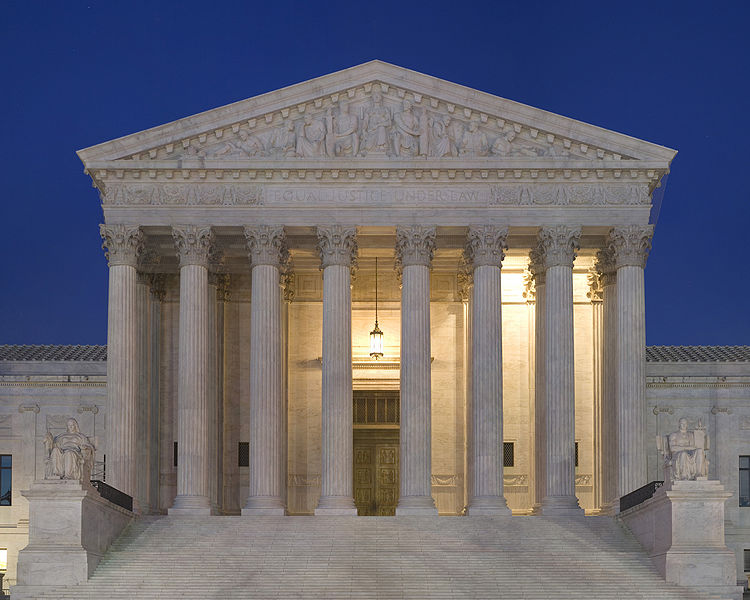
On January 17, the U.S. Supreme Court agreed to hear three new cases during its October 2019-2020 term: Ford Motor Company v. Montana Eighth Judicial District Court (consolidated with Ford Motor Company v. Bandemer), Chiafalo v. Washington (consolidated with Colorado Department of State v. Baca), and Little Sisters of the Poor Saints Peter and Paul Home v. Pennsylvania (consolidated with Trump v. Pennsylvania). As of January 21, the court had agreed to hear 73 cases this term.
In the consolidated case of Little Sisters of the Poor Saints Peter and Paul Home v. Pennsylvania / Trump v. Pennsylvania, the Trump administration issued regulations allowing for exceptions to the federal mandate to include contraceptive coverage in health insurance plans, following several years of litigation including two U.S. Supreme Court decisions regarding regulatory accommodations for religious and moral objections to mandatory contraceptive coverage in Obamacare.
The U.S Court of Appeals for the Third Circuit upheld a nationwide injunction that kept the rules from going into effect. It held that the states challenging the rules were likely to succeed in proving that the Trump administration violated the Administrative Procedure Act (APA), that Obamacare did not allow the regulations, and that the Religious Freedom Restoration Act (RFRA) did not require them.
The Little Sisters of the Poor Saints Peter and Paul Home appealed to the U.S. Supreme Court, arguing that the 3rd Circuit was wrong to deny the organization standing to appeal its decision against the contraceptive mandate exemption rules, that the 3rd Circuit’s decision creates a regulatory environment that violates the RFRA, and that the agencies did not violate the APA when they crafted exemptions to Obamacare’s contraception mandate.
The issues in the case are:
1. Whether a litigant who is directly protected by an administrative rule and has been allowed to intervene to defend it lacks standing to appeal a decision invalidating the rule if the litigant is also protected by an injunction from a different court.
2. Whether the federal government lawfully exempted religious objectors from the regulatory requirement to provide health plans that include contraceptive coverage.
In the consolidated case of Ford Motor Company v. Montana Eighth Judicial District Court / Ford Motor Company v. Bandemer, Ford vehicles were driven in car accidents. In Ford Motor Company v. Bandemer, a passenger sustained a severe brain injury and filed a claim against Ford for vehicle defects while alleging that the passenger-side airbag failed to deploy. In Ford Motor Company v. Montana Eighth Judicial District Court, a Ford vehicle’s tire experienced a tread/belt separation, the car lost stability and rolled into a ditch, and the driver died in the crash. A personal representative filed claims against Ford for liability and negligence.
Ford moved to dismiss both cases in their respective state district courts, citing a lack of personal jurisdiction. In both cases, Ford’s motions were denied. On appeal in both cases, the state courts of appeal affirmed the rulings of the district courts. Ford appealed the cases to the state supreme courts, which affirmed the rulings of the courts of appeal. On September 18, 2019, Ford petitioned the U.S. Supreme Court for review of both cases.
The issue in the case is: Whether the “arise out of or relate to” requirement of the Fourteenth Amendment’s due process clause permits a state court to exercise specific personal jurisdiction over a nonresident defendant under Burger King Corp. v. Rudzewicz when none of the defendant’s forum contacts caused the plaintiff’s claims, such that the plaintiff’s claims would be the same even if the defendant had no forum contacts.
In the consolidated case of Chiafalo v. Washington / Colorado Department of State v. Baca, state-appointed presidential electors voted contrary to their respective state’s laws requiring that they cast their electoral college ballots for the winner of the popular vote. The electors were then penalized by their respective states.
The electors appealed the penalties, challenging their constitutionality. In Colorado Department of State v. Baca, the federal circuit court affirmed in part and reversed in part the findings of the district court and remanded the case. In Chiafalo v. Washington, the state supreme court affirmed the ruling of the trial court.
In October 2019, the Colorado State Department and the appellants in Chiafalo v. Washington filed petitions for review with the U.S. Supreme Court.
The issues in the case are:
1. Whether enforcement of state laws threatening penalization for presidential electors who cast electoral college ballots contrary to how the law directs is unconstitutional because a state has no power to legally enforce how a presidential elector casts his or her ballot,
2. Whether a state penalizing an elector for exercising his or her constitutional discretion to vote violates the First Amendment,
3. And whether Article II or the Twelfth Amendment forbids a state from requiring presidential electors to follow the state’s popular vote when casting electoral college ballots.
Click here to learn more.
Additional reading:
Chiafalo v. Washington
Ford Motor Company v. Montana Eighth Judicial District Court
Little Sisters of the Poor Saints Peter and Paul Home v. Pennsylvania

